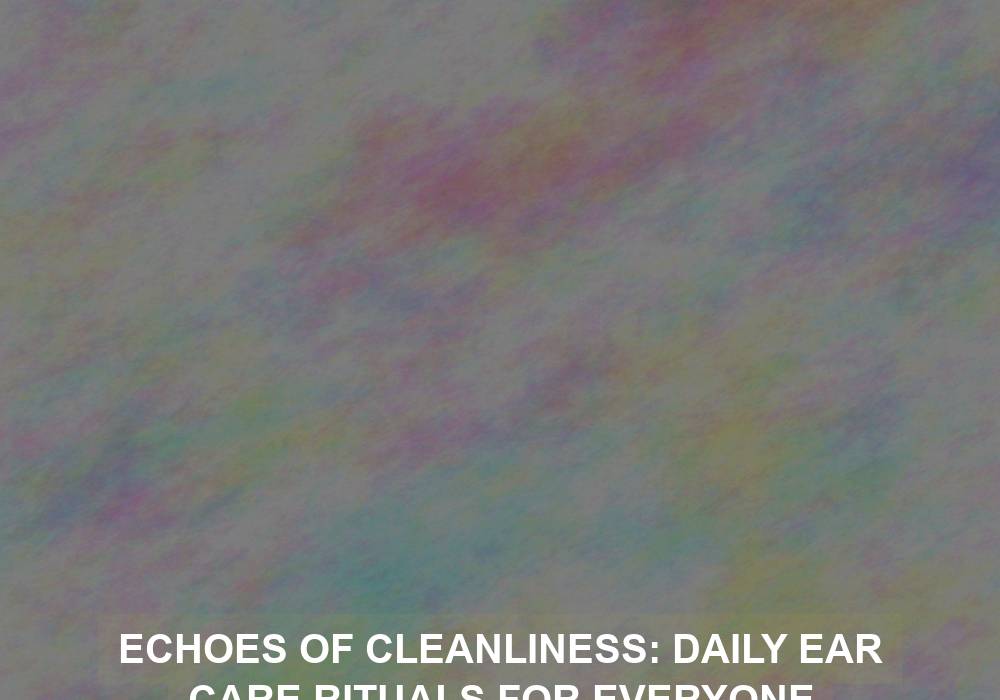Taking care of our ears is an essential part of maintaining overall health and well-being. Our ears enable us to hear the world around us, communicate effectively, and enjoy the beauty of sound. However, many of us tend to overlook the importance of ear care in our daily routines. In this article, we will explore some simple yet impactful daily ear care rituals that can help keep our ears healthy and free from potential complications.
Cleanliness Is Key
Maintaining clean ears is crucial in preventing various ear problems, such as earwax buildup, infections, and discomfort. Here are some daily ear care rituals to incorporate into your routine:
-
Gentle Cleaning: Start by gently cleaning the outer part of your ears with a soft cloth or a cotton ball. This helps remove any dirt or debris that may have accumulated throughout the day. Remember to be gentle and avoid using cotton swabs, as they can push the earwax deeper into the ear canal, leading to blockages or damage.
-
Avoid Excessive Moisture: Excessive moisture in the ears can create a favorable environment for bacteria and fungi to thrive, increasing the risk of infections. After showering or swimming, it’s important to dry the outer part of your ears thoroughly. Use a clean towel or a hairdryer on a low setting to gently dry the area. By keeping your ears dry, you can minimize the chances of developing infections.
-
Proper Earwax Management: Earwax, also known as cerumen, is a natural substance that helps protect the ears from dust, dirt, and bacteria. However, excessive earwax buildup can lead to discomfort and hearing problems. To manage earwax effectively:
- Don’t Overclean: While it’s important to keep your ears clean, avoid excessive cleaning of the ear canal. Overcleaning can disrupt the natural self-cleaning process of the ears, which can lead to dryness and irritation. Instead, focus on gently cleaning the outer part of your ears.
- Consult a Professional: If you experience symptoms like hearing loss, pain, or a feeling of fullness in your ears, it’s advisable to consult a healthcare professional. They can safely remove excessive earwax using specialized tools or techniques. A professional can also provide guidance on how to prevent future earwax buildup.
Prevention of Ear Infections
Ear infections are common, especially among children. However, they can also affect adults. By incorporating these preventive measures into your daily ear care routine, you can reduce the risk of developing ear infections:
-
Maintain Good Hygiene: Proper hygiene plays a crucial role in preventing ear infections. Before touching your ears or inserting any objects into them, make sure to wash your hands thoroughly with soap and water. This helps prevent the transfer of bacteria or viruses from your hands to your ears.
-
Avoid Sharing Personal Items: Sharing personal items, such as earphones or earbuds, can spread bacteria and increase the risk of infections. It’s important to keep your personal ear-related items solely for your use. Avoid sharing them with others to minimize the chances of contamination.
-
Protect Your Ears: Engaging in activities that expose your ears to loud noises or water can increase the risk of ear infections. To protect your ears:
- Wear Earplugs or Earmuffs: In noisy environments, such as concerts or construction sites, wear earplugs or earmuffs to reduce the exposure to loud noises. Prolonged exposure to loud noises can damage the delicate structures of the ears and increase the risk of infections.
- Use Earplugs or a Swimming Cap: While swimming or engaging in water activities, use earplugs or a swimming cap to prevent water from entering the ear canal. Excess moisture in the ears can create a breeding ground for bacteria, leading to infections.
Recognizing and Addressing Ear Problems
It’s important to be aware of the signs and symptoms of common ear problems. By recognizing these early on, you can seek appropriate medical attention and prevent the condition from worsening. Here are some common ear problems and their associated signs:
-
Earwax Blockage: Excessive earwax buildup can lead to blockages, causing symptoms such as ear pain, hearing loss, ringing in the ears (tinnitus), and a feeling of fullness or pressure. If you experience any of these symptoms, it’s crucial to consult a healthcare professional for proper diagnosis and treatment. They can safely remove the earwax and provide relief.
-
Ear Infections: Common signs of an ear infection include ear pain, swelling, redness, fluid drainage, and difficulty hearing. Mild infections may resolve on their own, but if symptoms persist or worsen, it’s important to seek medical assistance. A healthcare professional can diagnose the infection and recommend appropriate treatment, which may include antibiotics or eardrops.
-
Tinnitus: Tinnitus refers to a ringing, buzzing, or humming sound in the ears. It can be a symptom of an underlying condition or exposure to loud noises. If tinnitus persists or significantly affects your daily life, it’s advisable to consult a healthcare professional for evaluation. They can determine the cause of tinnitus and provide appropriate management strategies.
Remember, self-diagnosis and self-treatment may not always be accurate or effective. It is essential to consult a qualified healthcare professional for proper diagnosis and treatment of any ear-related concerns.
Conclusion
Incorporating daily ear care rituals into our routine is vital for maintaining healthy ears and preventing potential complications. By practicing gentle cleaning, managing earwax effectively, preventing infections, and recognizing early signs of ear problems, we can ensure optimal ear health. However, if you experience any persistent or concerning symptoms, always seek professional medical advice. Let’s prioritize the cleanliness and well-being of our ears and embrace the beauty of sound in our lives.

